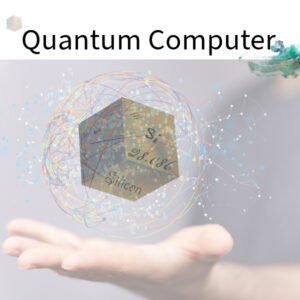Exploring the World of Quantum Computing: Simulation Software Available
In the realm of quantum computing research, IBM stands as a prominent leader, spearheading innovative developments and pioneering advancements in this cutting-edge field. However, IBM is not alone in this endeavour; several other organizations and research institutions are actively contributing to the exploration and understanding of the quantum realm. Before delving into the specifics of simulation software and IBM’s role, let’s take a moment to grasp the concept of the quantum world.
The quantum world, as envisioned by pioneers like Erwin Schrodinger and Werner Heisenberg, is a realm governed by the principles of quantum mechanics. This branch of physics revolutionized our understanding of nature at the smallest scales, revealing a reality far removed from our classical intuitions. At the heart of quantum mechanics lies the notion of superposition, where particles can exist in multiple states simultaneously, and entanglement, where the properties of particles become interconnected regardless of the distance between them. These concepts challenge our classical understanding of reality and form the foundation of quantum computing.
Now, let’s shift our focus to the tools and resources that enable us to explore and harness the power of quantum mechanics. Simulation software plays a crucial role in this endeavour, providing researchers and enthusiasts with the means to experiment, simulate, and understand quantum phenomena in a controlled environment. Among the various simulation software available, IBM’s Quantum Information Science Kit (Qiskit) stands out as a leading platform for quantum development. Qiskit offers a comprehensive suite of tools and libraries for quantum programming, allowing users to design, simulate, and execute quantum algorithms on real quantum hardware.
While IBM takes the spotlight in quantum computing research, other organizations are also making significant contributions to the field. Rigetti Computing, for example, offers the Rigetti Forest toolkit, which includes pyQuil, a Python library for quantum programming in the cloud. QuTiP, an open-source software written in Python, provides researchers with a powerful tool for simulating the dynamics of open quantum systems. Additionally, the Quantum IO Monad library in Haskell offers a unique approach to defining quantum computations within the Haskell programming language.
In conclusion, the exploration of the quantum world is a fascinating journey filled with challenges and discoveries. IBM’s leadership in quantum computing research, coupled with the contributions of other organizations and research institutions, is driving the advancement of this transformative technology. With simulation software paving the way for experimentation and innovation, we are poised to unlock the full potential of quantum computing and usher in a new era of computational capabilities.
Quantum IO Monad: A Haskell Approach
The Quantum IO Monad is a library designed to define quantum computations in Haskell. Functioning as an embedded language within Haskell, the Quantum IO Monad provides functions to simulate the execution of quantum computations. This library comes with a variety of example computations, including an implementation of Shor’s algorithm, providing users with an opportunity to experiment and explore the principles of quantum computing within a familiar environment (HASKELL, 2018).
QuTiP: Simulating Quantum Systems in Python
QuTiP is an open-source software designed to simulate the dynamics of open quantum systems. Written in Python, QuTiP relies on numerical packages such as Numpy, Scipy, and Cython, providing a flexible and accessible platform for studying quantum phenomena. Additionally, graphical output is facilitated by Matplotlib, allowing for clear and detailed visualization of simulation results (QuTiP, 2018).
Check out the links below and start working on some quantum projects yourself.
QISKIT: Developing Quantum Applications with IBM Q
Qiskit, or Quantum Information Science Kit, is a software development kit (SDK) designed to develop quantum computing applications and work with NISQ (Noisy-intermediate Scale Quantum) computers, such as IBM Q. Qiskit is composed of several components that work together to enable quantum computing. One of the core components is Terra, which serves as the foundation upon which the rest of Qiskit is built, providing a robust and comprehensive framework for developing and executing quantum algorithms (QISKIT, 2018).
pyQuil from Rigetti Forest: Quantum Programming in the Cloud
pyQuil is part of the Rigetti Forest toolkit for quantum programming in the cloud. This open-source Python library, developed by Rigetti Computing, allows for the construction of programs for quantum computers. pyQuil generates programs in the Quantum Instruction Language (Quil) and creates a cloud execution environment (Forest), offering users a powerful way to experiment and explore quantum computing concepts within a familiar programming environment (PYQUIL, 2018).
Exploring the Possibilities of Quantum Computing
Quantum computing simulations play a crucial role in understanding the fundamental concepts and principles of quantum computing. By providing tools and resources to experiment and explore these concepts, simulation software empowers researchers to investigate the revolutionary potential of quantum computing in a variety of applications.
With the increasing access to quantum computing resources, such as D-Wave, Rigetti, IBM, and Google processors, and the ongoing advancements in the field, we are witnessing an exciting period of discovery and innovation. As we continue to explore and understand the fundamentals of quantum computing, we are opening the doors to a new era of technological possibilities.
References:
- HASKELL. Quantum IO Monad. Available at: https://hackage.haskell.org/package/QIO
- QuTiP. Available at: https://qutip.org/
- QISKIT. Available at: https://www.ibm.com/quantum/qiskit
- PYQUIL. Available at: https://pyquil-docs.rigetti.com/en/stable/index.html
This article provides an overview of the simulation software available for quantum computing, highlighting its importance and potential to advance our understanding in this exciting and ever-evolving field.
